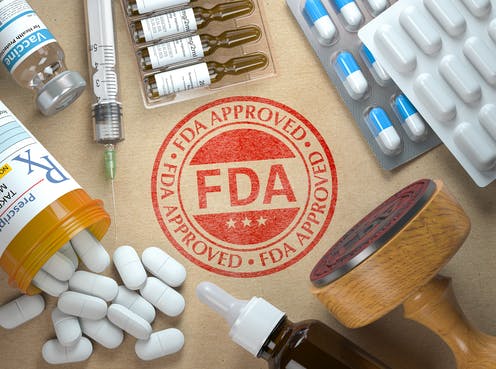
The Research Brief is a short take about interesting academic work.
Table of Contents
The Big Idea
The Food and Drug Administration provides less stringent oversight of overseas research trials used in deciding whether to approve a drug than those conducted domestically. That was the finding of my recent study, published in the Journal of Clinical Pharmacology.
My study highlighted loopholes in the agency’s oversight processes that exploited vulnerable people and led to faulty data for drug approval decisions. Until the early 2000s, participants in FDA-reviewed research trials came almost entirely from the U.S. But a 2010 report from the Department of Health and Human Services found that 78% of research participants were enrolled overseas. Faster research subject recruitment and lower expenses – paired with these regulatory loopholes – seem to be driving this shift.
It isn’t clear how often these gaps allow problematic trials to slip through the system, because trials that go wrong can simply not be disclosed, and there are virtually no on-site inspections.
In one example, a 2001 trial based in India allowed the use of placebo control in patients with severe mental illness when there were effective alternative therapies available. In another Indian trial, patients were untruthfully told that their medication to treat mania was no longer available and that they could receive only an experimental drug or placebo. Some patients did not even know they were in a trial.
In a study I published in 2020, I cited a trial performed in India in which electrocardiograms filed for multiple people were later discovered to be fraudulent copies from a single person. I also came across an example of large-scale data manipulation from Chinese study sites to make an experimental drug seem more effective than it really was.
The number of drugs that are approved but later had to be withdrawn or have new serious warnings for adverse events has increased from 21 per 100 drugs before 2012 to 27 per 100 drugs thereafter. This coincides with the dramatic shift to overseas clinical trials intended for FDA drug approval.
Why it matters
Before researchers can begin human testing of experimental drugs in research subjects on U.S. soil, companies must submit “Investigational New Drug” applications to the FDA. These applications describe the lab-based testing they conducted and all the trials they plan to carry out on U.S. citizens. The FDA can prevent unethical trials from beginning in the U.S. given its authority under the Interstate Commerce Act of 1887 but only because the experimental drug crosses state lines.
But a loophole exists for overseas research, since the experimental drug does not need to cross U.S. state lines. This means companies can begin overseas research trials before the FDA assesses the drug application, and they do not have to disclose all the research they intend to perform.
To get an experimental drug approved by the FDA, the companies must submit a New Drug Application to the agency. For research trials that were previously proposed to the FDA, the companies are required to include all trial data. However, when trials are conducted overseas unbeknownst to the FDA, companies can cherry-pick supportive trials and leave out those with negative findings. Thus, the FDA may not have a complete picture of the drugs’ potential benefits and adverse events when deciding if it should be approved.
What’s next
Since the 1990s, the FDA has been increasingly funded by user fees from the companies it regulates. These fees cover the costs of many FDA functions, including product approvals and manufacturing facility inspections. They are paid by pharmaceutical, biotechnology and device companies as well as generic drug manufacturers. User fees were initially introduced to speed up the drug approval process for HIV medications early in the HIV/AIDS epidemic.
These user fees are negotiated between the FDA and the companies and then approved by Congress. In 2022, the newly negotiated fees are set to go into effect for five years. During the last negotiation in 2017, the FDA proposed a fee to fund trial site inspections in developing countries, but the companies refused. As a result, foreign clinical trial sites are 27 times less likely to be inspected by the FDA than those in the U.S.
![]()
C. Michael White does not work for, consult, own shares in or receive funding from any company or organization that would benefit from this article, and has disclosed no relevant affiliations beyond their academic appointment.






















